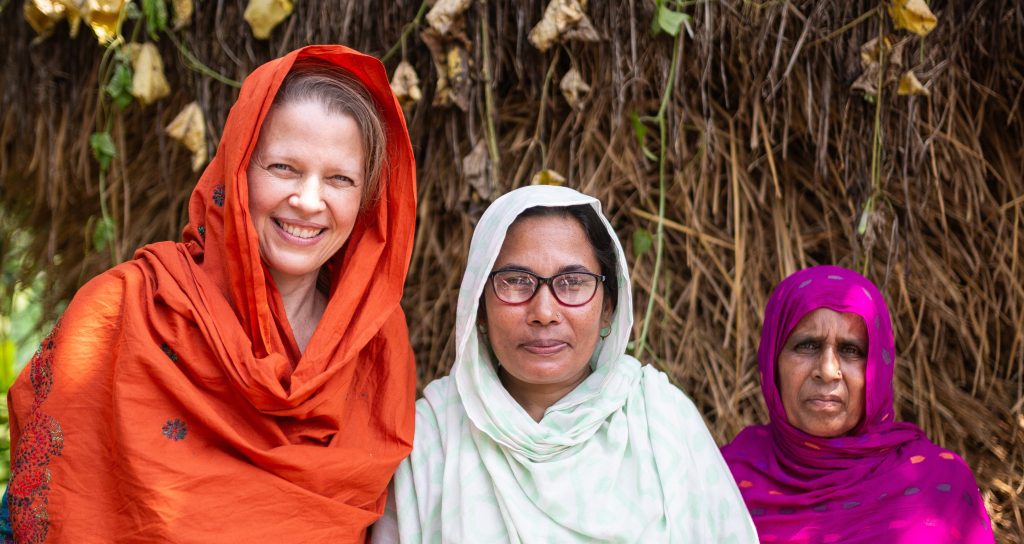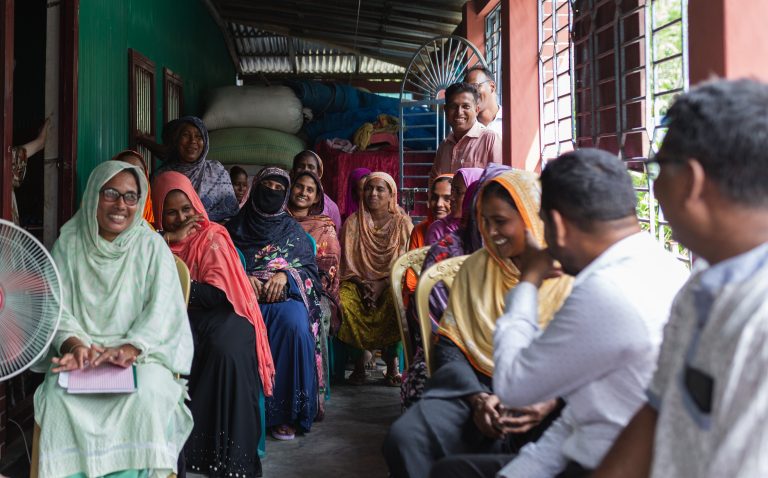Pictured: The women of Tenaki – a local Community Development Organisation refusing to accept the illegal practice of marrying of young girls within their community.
Child marriage has historically been high in Bangladesh which has the 8th highest prevalence of child marriage in world! UNICEF’s Multiple Indicator Cluster Survey 2019 identified 51.4% of women (at that time aged 20-24) had been married before age 18. That is 38 million girls. 15.5% of these girls had been married before age 15.
This hadn’t improved over the previous decade even though legal age is 18 years and older.
There are many reasons that families are tempted to marry their girls off at a young age. Poverty, food insecurity, school dropout, parental stress, dowry payments, the perception that marriage will provide ‘protection’ (families often believe it is safer for their young girls to be married than to be single and more vulnerable to sexual abuse by young men in their communities), family honour, or religious and cultural customs that tolerate the practice.
The single largest factor is family poverty, where marrying a young girl off to an older man simply means the family doesn’t have to feed her anymore.
COVID-19 lockdowns were predicted to have significant effects on child marriage. Sadly, poverty levels have increased and worsened since the COVID pandemic began, with corresponding increases in child marriage. And younger girls.
In 2023, marriages of girls aged under-15 increased by 26.15%. Bangladesh Sample Vital Statistics 2023, released last week, show the rate is significantly high for girls living in poor, rural areas. Many of these girls will give birth at least once before they are 18.
These are the areas Symbiosis works in.
Why does child marriage matter?
- Lower decision making power impacts her nutrition, use of contraception, her rights and opportunities.
- Adolescent pregnancy brings increased risk of preeclampsia (pregnancy related high pressure), anaemia, premature labour, difficult childbirth, low birth weight of baby, much higher risk of mother and baby death.
- More likely to experience sexual and domestic violence.
- Most Bangla girls would prefer to get married later in life (UNFPA, 2022).
- Married girls usually drop out of school to attend to family and domestic duties and are thus deprived of school education. This continues the generational cycle of poverty.
How is Symbiosis impacting child marriage?
In 2023 a visiting team met the women of the Tenaki Community Based Organisation (CBO). These women live on one the large sandbar islands on the Jamuna River and had been together as a CBO for six years. The Tenaki CBO is registered with the Bangladesh Government which gives the CBO some legal clout, which they are using.
Visiting team member David Vance wrote “they’re passionate about doing things to benefit their communities, including trying to stop kids from dropping out of school, and teaching hygiene, but the thing they’re most passionate about is stopping child marriage.”
“The Tenaki women don’t beat around the bush. If they hear of an impending marriage involving a child, they speak to the families involved and try to convince them to stop the marriage. If that doesn’t work, they go to the local authorities, the police and other government representatives and use their legal status as a government-registered organisation to pressure those people to do their jobs and stop the marriage.”
These women were married young. Through their efforts, there are now very few child marriages in their communities.
“The women say that they haven’t made too many enemies in their communities through their strong stance. Most people eventually accept that it is best for their daughters for them not to be married too young. So, despite the ongoing and widespread problem of child marriage in Bangladesh, an empowered group of Symbiosis women has put their collective feet down and virtually eliminated child marriage in their communities”.
One group of women impacting their communities and empowering young women and girls to have a different future.
This is why Symbiosis International works to establish Savings and Self-Help Groups where women are taught to read and write, and that they have rights and decision making power. In forming CBOs, they are able to extend their influence beyond their own their families into communities, bringing change to the generations.
Your support means that Symbiosis can continue to partner with women like the Tenaki CBO as they seek to transform their communities. Join our Annual Fundraising Breakfast to hear more as Lisa shares about her encounters with these inspiring women.

